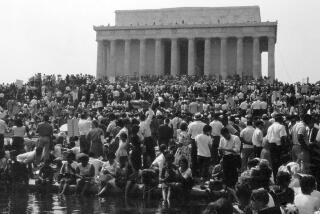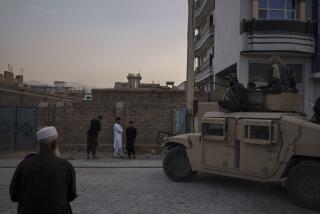Rival Iraqi Kurd Leaders Will Meet in Washington for Talks
- Share via
ANKARA, Turkey — Hoping to help rebuild an opposition movement in Iraq, the Clinton administration is bringing the leaders of two rival Iraqi Kurdish factions to Washington for face-to-face talks aimed at ending their conflict.
A meeting between Massoud Barzani of the Kurdistan Democratic Party and Jalal Talabani of the Patriotic Union of Kurdistan is expected to take place within the next two weeks. The U.S. effort comes amid concern that Iraqi President Saddam Hussein may be ready to use force to reassert his rule over Kurdish-controlled northern Iraq.
“I am going to find out what exactly the Americans have in mind for the [Iraqi] opposition,” Barzani said Saturday during a stopover in Ankara en route to Washington, where he is scheduled to arrive today for talks with U.S. officials.
“If the Americans want to use us merely as a pressure card against Iraq, I will never allow that,” he said. “We want ironclad guarantees that the Americans will protect us against any form of Iraqi aggression. If they have a realistic plan for the opposition that . . . foresees the establishment of a Kurdish federation within Iraq’s existing borders, we will consider it.”
Barzani said he was hopeful that a meeting with his bitter rival, Talabani, who is due in Washington on Sept. 14, will help revive a power-sharing arrangement that collapsed four years ago.
An official involved in the visit confirmed that “fresh strategies to revive the Iraqi opposition will be very much on the agenda. But there is no question of dismembering Iraq.”
On Tuesday, the Senate moved to bolster Iraq’s “democratic opposition” movement with $10 million in U.S. assistance. The rival Kurdish leaders are a key part of that movement.
“Without the full collaboration of the Kurds, the Iraqi opposition becomes meaningless,” an Arab diplomat in Ankara said.
Barzani’s and Talabani’s forces have controlled northern Iraq since the end of the 1991 Persian Gulf War, when the United States and its allies declared a “no-fly” zone over Iraqi territory north of the 36th parallel. The Kurdish “safe haven,” protected by U.S., British and Turkish fighter planes based in southern Turkey, is an essential element of Washington’s strategy of “containment” with regard to Hussein.
The two Kurdish factions shelved their long-standing rivalry and joined forces in a postwar regional administration. A CIA-backed armed Iraqi opposition movement--the Iraqi National Congress--began operating from Kurdish territory, grouping Sunni and Shiite Muslims with Christian Arab foes of Hussein’s regime.
But by 1994, Barzani’s and Talabani’s factions were back at war.
More to Read
Sign up for Essential California
The most important California stories and recommendations in your inbox every morning.
You may occasionally receive promotional content from the Los Angeles Times.










